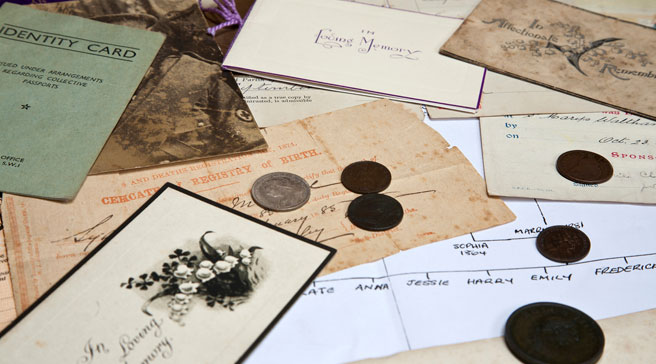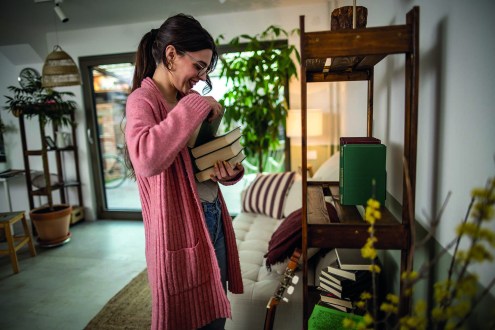Where do you belong?
Our fascination with tracing our family trees has never been greater, but what are we really looking for when we start digging up the past?

Of all the people I believe have influenced my life, there is one woman in particular of whom I am proud — even though we never met. Isabella Thom was my great-grandmother, a Victorian woman from Aberdeen who, on the eve of the First World War, was one of the first people to travel on the Trans-Siberian railway (it wasn’t even finished at the time). Her husband was in Japan, so she undertook this incredible journey without male protection, but also with two children under 10 in tow, and while she was pregnant with a third.
I don’t know a lot about my great-grandmother, but her story fills me with an illogical pride, and a deep sense of fascination. Above all, I love the fact that we are related by blood, that some of her spirit might run through me, that I can claim her in a way you only can with family.
My experience is far from unique. According to one research company, 21 million British adults have researched their family history, making genealogy one of the UK’s fastest-growing hobbies. (Genealogy websites are now the second most commonly visited on the internet, after pornography.) On TV, shows such as Who Do You Think You Are? and Heir Hunters tap in to our interest in our lineage. We’re desperate to discover connections, unlock mysteries, explain the parts of us that have never quite made sense in the context of our immediate family, but now prove with certainty that we belong.
Philosopher Julian Baggini suspects our current obsession with digging up the past has different origins, not least the popularity of the aforementioned shows, ‘but there is a deeper reason,’ he says. ‘Identity in society is becoming less stable, and perhaps people are looking to their families to supply the kind of stability of identity that nation or religion no longer can.’
‘At a time when people seem more dislocated, family trees can be a way to help people create a coherent story of origins,’ says Kate Daniels, consultant systemic family therapist at the Tavistock Centre for Couple Relationships. For most of us, the question ‘where are you from?’ has more than one answer, and often the further we migrate from our family home, the greater our need to define our roots. We shouldn’t underestimate the power of our need to belong.
When philosophy lecturer Dr Christopher Hamilton was 38, he was told that his father was not, in fact, his biological father. This discovery prompted all kinds of revelations about what it meant to be part of a family. ‘One thing I felt was a tremendous loneliness, I felt cut off from the rest of my family as I was no longer a “full-blooded” sibling,’ he says. ‘There was a very strong feeling I’d been ejected from the Hamiltons, as if my identity was suddenly temporary or insecure.’
As Hamilton points out at the beginning of his book Middle Age, his situation was unusual, but the questions he was grappling with are common for many of us, particularly if we experience some emotional upheaval, or as we reach mid-life. ‘Like adolescence, mid-life is characterised by a sort of restlessness that revolves around questions about who we are,’ he says. ‘But these questions can also be brought on by other events in our lives.’
It’s common for people to start searching out ancestors following a break-up or a death in the family. Equally, the search might be prompted by the birth of a child or a wedding. Our family tree offers us a chance to reconstruct our individual narrative. We want to know why we behave a certain way, why we chose that job, why we love books or travel. Looking for clues in the lives of those who came before us helps us define more clearly who we are, especially when we feel we are nothing like our immediate family, and want an explanation for our rebellious, or bookish, or inquisitive streak. Or perhaps they offer us a way of understanding what we’d like to be.
But is it anything more than fantasy to think these connections are important? After all, notes psychologist Jacqui Marson, ‘we’re all selective about the ancestors we choose to identify with’. We tell and retell the story of a glamorous suffragette aunt, but a quiet uncle who was a greengrocer for 40 years slips conveniently from memory. What matters is not whether the connections we make can be scientifically proven, but how we choose to interpret these links, and whether they can help make sense of our own lives.
Marson uses genograms in her counselling with clients as a way to explore psychological and emotional themes that might be recurrent in their family. Developed in the 1980s, a genogram is like a family tree, but can also show patterns of illness, secrets and behavioural traits. ‘I might plot a genogram with a client, and almost immediately, we’ll begin to see themes,’ says Marson. ‘The client might say, “Oh yes, now, my father hasn’t spoken to my uncle for 20 years, and then at my wedding my sister had a fight with my brother and they haven’t been in contact since. And then, look, on my husband’s side, his mother cut off her sister.” There’s a pattern there of very extreme behaviour, but the client might not have realised it.’ It can be very hard to see our own family with any clarity. After all, it is the family we were raised in, so we assume all our unspoken rules are normal. ‘This kind of compassionate, investigative eye can be so helpful in all kinds of situations,’ says Marson. ‘Perhaps you feel guilty about working long hours while your child is at nursery. It may help to speak to your mother or grandmother, ask them what they did and how they felt about it. It may be there’s some unspoken family rule about going out to work and leaving the kids with strangers, or perhaps a rule about the importance of women earning their own living. We don’t often have these kinds of conversation, but they are another way of moving forward.’
There’s no doubt that investigating our family tree can provide us with many valuable answers, but, says Baggini, we should also consider the wider context. ‘What matters is not that you understand your ancestors’ lives, but that you understand the lives of people in different times and places,’ he says. ‘This is always worthwhile because it enables us to see that the ways of our lives are not fixed. They could be different. It’s a good way of questioning assumptions about what the right way to live is.’








